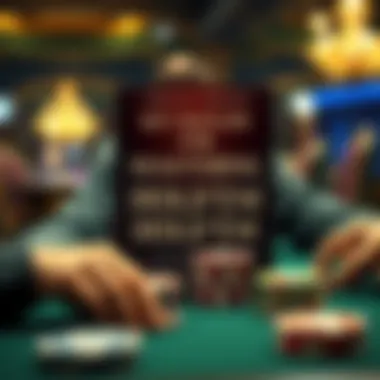Key Books for Excelling in Texas Hold'em Strategy


Intro
Mastering Texas Hold'em is not just about knowing how to play the cards, but also about understanding the game in depth. This involves a keen awareness of strategies, psychology, and probabilities. Books about Texas Hold'em can serve as invaluable resources for nurturing these aspects of the game. Literature provides insights from experienced players and theorists who have dedicated their lives to mastering this complex game.
Reading about poker can shape your strategic mindset and sharpen your skills. It offers a window into the minds of successful players and can illuminate various strategies that might not be easily caught at the tables.
In this guide, we’ll dive into some essential literature specifically tailored for poker players eager to excel in Texas Hold'em. We will explore significant texts with unique perspectives that can change the way you approach the game, regardless of whether you are a beginner trying to find your footing or a seasoned veteran looking to refine your strategy. Let’s take a stroll through the literary landscape that encapsulates the spirit of Texas Hold'em.
Game Reviews
In-Depth Analysis of Popular Books
When it comes to poker literature, several books stand tall among the rest. For instance, Harrington on Hold'em by Dan Harrington is often cited as a cornerstone for those serious about their game. This book breaks down fundamental strategies and discusses hand analysis, giving readers insight into how to think like a pro. It’s almost a rite of passage for players trying to enhance their tactical approach.
Another critical piece is The Theory of Poker by David Sklansky. This book, while not solely focused on Texas Hold'em, dives deep into fundamental concepts that apply across various forms of poker. Sklansky’s exploration of concepts such as pot odds, implied odds, and reverse implied odds offers a robust foundation for making informed decisions at the table.
Here’s a brief summary of these books:
- Harrington on Hold'em: Focuses on tournament strategy, hand selection, and reading opponents.
- The Theory of Poker: Provides comprehensive insights into poker theory applicable to multiple variants.
New Game Releases and Features
As the online poker world continues to evolve, new titles and features often emerge. Staying updated with releases from platforms like PokerStars or partypoker ensures players can access the latest innovations that can improve their experience. Features such as enhanced user interfaces or innovative game formats can offer fresh gameplay dynamics enticing experienced players and novices alike.
In cacophony of poker literature and online content, understanding the latest releases can help connect theoretical knowledge with practical application at the tables. Books that review these games in combination with current trends can keep strategic minds engaged.
Gambling Strategies
Effective Betting Strategies for Beginners
For novices, the betting structure in Texas Hold'em can be daunting. Understanding when to bet, call, or fold is crucial. A primary strategy is to focus on the importance of position at the table. Players in late position can leverage their knowledge of opponents' actions before making a decision. This strategy fosters progressive betting techniques.
Additionally, newcomers can benefit from learning about the concept of starting hands. Familiarizing oneself with strong starting hands can dramatically increase a player’s success rate. Books like Kill Everyone by Lee Nelson emphasize the significance of a solid pre-game strategy, offering invaluable insights to beginners.
Advanced Techniques for Seasoned Players
For those who’ve already honed their basic strategies, advancing to more intricate aspects of the game is the next logical step. Literature that focuses on psychological aspects of poker and advanced bluffing techniques can significantly elevate one’s game. Books like Phil Gordon's Little Green Book detail how to maintain focus and apply psychological tactics against opponents.
Moreover, literature that discusses bankroll management is essential for long-term success. Understanding risk, variance, and how to play conservatively can prevent beginners from becoming seasoned players who bust their bankrolls.
"The more you know, the less you will burn." Understanding risks through literature solidifies a player’s approach in both cash games and tournament settings.
By delving into these essential texts and strategies, players can foster their love and mastery of Texas Hold'em, equipping themselves with the necessary tools to thrive in an ever-challenging environment.
Intro to Texas Hold'em Literature
When it comes to mastering Texas Hold'em, understanding the literature surrounding the game is not just beneficial; it's crucial. The right books can be a lifeline for novice players and seasoned pros alike. These texts serve as both compasses and mirrors, guiding players toward strategic excellence while reflecting their progress along the way.
Diving into poker literature allows players to absorb the nuances of the game—from basic rules to complex strategies. With every page turned, players are not merely absorbing words; they are engaging with theory, analyzing psychology, and cultivating a mindset that aligns with the unpredictable nature of the game. This engagement fosters a deeper appreciation of Texas Hold'em as a multifaceted endeavor, one that requires not just luck but a well-honed skill set.
Books can illuminate different avenues of understanding, whether it's through historical context, analytical frameworks, or psychological insight. They can also help players identify their strengths and weaknesses, paving the way for targeted improvement. By investing time in strategic reading, players are setting the stage for a future that is more informed and calculated.
The Importance of Strategic Reading
Strategic reading in the context of Texas Hold'em is akin to rehearsing for a performance. It prepares players for the stage where real money is at stake. The literature presents various strategies, ranging from risk management to opponent behavior analysis. Engaging with this material enhances players' ability to think critically and adaptively during gameplay.
Consider this: the more a player understands different strategies, the more versatile they become. They learn what's at play beneath the surface, from probabilities to pot odds. Knowledge gained from comprehensive literature equips players with the tools to deconstruct their own game and others'.
Moreover, books often provide insights that online articles or video tutorials lack due to the depth required to explore intricate principles. A thorough examination of a well-written text enables players to refer back to concepts and strategies as they evolve.
How Books Shape Your Game Understanding
Books are not just repositories of information; they are transformative catalysts in a player's journey. Each author brings a unique perspective, shaped by their experiences and analyses. By working through their strategies, players can tailor their approaches to what feels right for them.
For instance, Dan Harrington's insights can open players' eyes to tournament strategies that differ vastly from cash games. On the flip side, David Sklansky’s foundational theories elevate a player's understanding of the game’s mathematics, thus fortifying their strategic decisions.
In summary, literature on Texas Hold'em serves as a vast spectrum of knowledge. Engaging with a diverse array of books not only sharpens a player’s skills but also enriches their overall game understanding. As players grow more literate in poker strategy, they cultivate a competitive edge that often translates to success at the tables.
"In poker, like in life, understanding the rules and nuances of the game can spell the difference between success and failure."
As players immerse themselves in evolving literature, they embrace a journey characterized by continuous improvement and heightened awareness. This commitment to self-education is the bedrock of any serious player's success.


Foundational Texts in Poker Strategy
Understanding the foundational texts in poker strategy is akin to possessing a compass in the vast ocean of Texas Hold'em. These texts lay the groundwork for aspiring players, offering critical insights into fundamental concepts, strategic frameworks, and practical techniques that can elevate a player's game.
Without strong roots in strategy, navigating the complexities of the table can feel overwhelming. Foundational books introduce players to essential elements such as pot odds, expected value, and hand rankings—concepts that are vital for solid decision-making during play. A well-crafted strategy, honed from these initial texts, helps players avoid common pitfalls and fosters a deeper understanding of their opponents' behaviors.
Some benefits of diving into foundational texts include:
- Enhanced Decision-Making: Learn how to analyze situations based on mathematical probabilities and psychological nuances.
- Skill Development: Foundational works encourage practicing skills through example hands and strategic puzzles.
- Adaptability: Armed with knowledge, players can tweak their strategies to fit various game styles and opponent tendencies.
- Confidence Building: Familiarity with core principles fosters a sense of readiness, bolstering confidence at the felt.
It's crucial to approach these texts not just as manuals, but as evolving dialogues in the world of poker. Engaging with these texts can instill a lifelong commitment to learning, underscoring that the journey of mastering Texas Hold'em is ongoing.
The Theory of Poker by David Sklansky
David Sklansky's The Theory of Poker is often heralded as a cornerstone of poker literature. First published in 1999, it encapsulates the sophisticated thought processes behind the game. Sklansky doesn't just scratch the surface; he delves deep into concepts that even seasoned players might find enlightening.
In this work, he presents underlying theories that govern successful play, such as the fundamental theorem of poker, which posits that one should play in a manner contrary to how their opponents would play with the same hands. This philosophical principle highlights the dual nature of poker: it is both mathematics and psychology.
Key takeaways from this text include:
- The importance of understanding the odds and their impact on decision-making.
- Insights into the semi-bluffing, a technique so crucial in advanced play.
- How to read opponents and anticipate their moves based on their behavior and betting patterns.
Harrington on Hold'em by Dan Harrington
Dan Harrington's Harrington on Hold'em series represents another crucial pillar in poker strategy. A three-volume set, these books bridge theory and practical application, particularly focusing on tournament play. Harrington, a World Series of Poker Champion, shares his insights from high-stakes play, making this series invaluable for serious players.
In this series, Harrington meticulously breaks down various phases of a tournament, offering strategies for early, middle, and late stages. His approach integrates practical exercises that allow readers to put theory into action, promoting effective play in real-world scenarios.
Some standout features of this series include:
- Comprehensive breakdown of hand ranges based on position, stack sizes, and tournament context.
- Advanced concepts such as short-handed play and how to apply pressure effectively.
- Real-life examples and hands analyzed in detail, which can clarify the application of strategies discussed.
It is worth noting that both of these foundational texts serve different yet complementary purposes. While The Theory of Poker offers a broad overview of concepts, Harrington on Hold'em drills down into specific scenarios that a player may encounter, especially under the pressure of tournament conditions. Together, these works form an essential part of any poker player's library.
Advanced Techniques and Strategy
Understanding advanced techniques and strategies in Texas Hold'em is like having a treasure map that guides you through the often tumultuous waters of the poker table. While the fundamentals are critical, it's the subtler nuances that can set a player apart, revealing not just how to play the hand dealt but how to outsmart the competition over the long haul. These strategies hinge on the profound interplay between game psychology and mathematical rigor.
When approaching advanced techniques, players gain a toolbox of strategies that can be deployed depending on the situation at hand. This can include concepts like bluffing effectively, understanding pot odds, and being adept at reading various betting patterns.
Players who master these techniques can navigate games with greater confidence. They often display a tactical foresight that allows for better decision-making under pressure. Here are a few benefits and considerations regarding these advanced strategies:
- Enhancement of Decision-Making: Knowing when to fold or push your bets is critical. Advanced strategies help you sharpen this skill, enabling quicker and more informed choices.
- Anticipate Opponents: By employing psychological tactics, you can gain insight into your opponents’ possible hands and play against their styles.
- Adjusting to Game Dynamics: Each table has its unique atmosphere. Mastering strategies helps you adapt your gameplay as the dynamics shift.
Applications of Mathematical Concepts
At the heart of advanced poker strategy lies a deep connection to mathematics. Poker is not solely about luck; it's also about probabilities and expected values. Understanding these mathematical concepts can elevate a player’s game dramatically. For instance, by calculating pot odds, a player can determine whether a call is justifiable based on the amount currently in the pot relative to the cost of a call.
Common mathematical applications in poker include:
- Expected Value (EV): Helps determine the average outcome of a specific play over time, critical for making long-term beneficial decisions.
- Pot Odds Calculation: This involves comparing the current size of the pot to the cost of a contemplated call, enabling strategic calls or folds based on mathematical reasoning.
- Implied Odds: Going beyond current pot size, this concept factors in future bets you can expect to win should you complete your hand.
These concepts foster a rigorous analytical approach to the game, which is something that separates great players from the rest.
The Mathematics of Poker by Bill Chen and Jerrod Ankenman
Among the myriad of poker literature, The Mathematics of Poker stands as a pivotal resource that demystifies the numerical side of gameplay. Authored by Bill Chen and Jerrod Ankenman, this book goes well beyond basic math; it immerses the reader in the intricacies of statistical reasoning as it pertains to poker.
The insights garnered from this book can significantly enhance a player's understanding of not just how to calculate odds but why these calculations matter in different gaming contexts. It includes a series of examples that illustrate the application of mathematical concepts in playing strategically against opponents.
Some highlights covered in the book include:
- Game Theory Application: Explaining how to evaluate mixed strategies.
- Analysis of Bluffs: Offering deep dives into when and how to successfully execute a bluff based on mathematical reasoning.
- Monte Carlo Simulations: Discussing how to use simulations to predict outcomes based on various ranges of hands.
"Understanding the mathematics behind poker is not just about crunching numbers; it's about leveraging that knowledge to elevate your gameplay and enhance your decision-making process."
In Summary, the intersection of advanced techniques and mathematical principles forms the backbone of a superior strategic approach in Texas Hold'em. Players willing to invest time and effort in these areas are generally the ones who find themselves climbing higher in skill and success. To truly master the game, it's essential to embrace these concepts and adapt them to one’s unique style.
Psychology and Behavior at the Table
The realm of Texas Hold'em isn't just stocked with chips and cards; it's a stage where human behavior plays a starring role. Understanding psychology and behavior at the table can significantly impact your success. Every flicker of an eyelid or twitch of a finger tells a story, revealing information that might sway the outcome of a hand. As you delve deeper into the psychology of your opponents, you can fine-tune your strategies and gain an edge, sometimes even before the first card is dealt.


This exploration hinges on several crucial elements: observance, emotional intelligence, and adaptability.
Understanding Opponents: A Psychological Approach
To thrive in Texas Hold'em, it’s vital to hone your ability to read opponents—much like an actor studies a script before hitting the stage. By carefully observing body language, facial expressions, and even speech patterns—or lack thereof—you can gather insights into an opponent’s mindset. Some players may put up a stoic front, while others might be more animated. Paying attention to these nuances can offer hints about how strong their hand is, or whether they’re bluffing.
For instance, a player who frequently avoids eye contact may be hiding a weak hand. In contrast, confident players who maintain steady gaze and relaxed postures might just be servicing a mighty hand. Using these observations will help you develop a psychological profile of your opponents and adjust your tactics accordingly.
- Key Considerations:
- Look for patterns over time. One-off tells can be misleading.
- Use your own behavior strategically to mask your intentions.
- Evaluate your emotional state and how it might influence your performance.
Mindset and Mental Preparation
Mental preparation is no less crucial than understanding the psyche of your opponents. When you sit down to play, your mindset can determine the fortunes you either gain or lose. Building resilience, managing tilt—an emotional reaction to losing—and maintaining focus is essential in high-stakes situations where every move counts.
Developing a cultivation of patience and discipline, rather than simply seeking instant gratification, could be what separates a good player from a great one. A solid mental framework allows players to approach each game not just as a series of hands but as a continuum of decision-making moments. This evolution in your approach could involve setting tangible goals, whether they be bankroll management or developing a set of situational strategies.
- Components of Mental Preparation:
- Goal Setting: Determine what you want to achieve from each session.
- Visualization: Picture successful hands and strategies playing out in your mind.
- Reflection: After each session, analyze what went well or poorly and adjust your approach accordingly.
Engaging deeply with the psychological elements of the game enriches your understanding and equips you with the tools to navigate the complexities of human interaction at the poker table.
As you integrate psychological analysis and mental fortitude into your Texas Hold'em repertoire, you'll find yourself more adept—not just at reading the table, but also at reading yourself. In poker, it’s as much about understanding others as it is mastering your own mind.
Reading Styles and Approaches
When it comes to mastering Texas Hold'em, the way one consumes literature can significantly shape their understanding and approach to the game. Different reading styles and approaches cater to a vast array of learning preferences, making reading not just a pursuit of knowledge but also a strategic choice in itself. By adapting to different methods, players can optimize their learning, thus enhancing their game over time.
Exploring various literature approaches, you start to uncover nuances that might be lost in a single-mode reading. Each type of text offers unique insights and can serve different purposes depending on where you stand in your poker journey.
Benefits of engaging with a variety of reading styles include:
- Diverse Perspectives: Books focused on strategy, psychology, and real-life case studies each provide a different lens through which to view the game.
- Skill Enhancement: Moving beyond traditional instructional texts helps players develop a more nuanced understanding of the game, learning not only from theory but also from real-life examples and psychological insights.
- Flexibility in Learning: Whether you prefer deep dives into formal texts or practical, anecdotal narratives, having a mix allows you to adapt your approach according to your needs.
By being intentional about your reading strategy, you can maximize retention and application of knowledge in actual gameplay. For instance, someone who thrives on detailed breakdowns might prioritize classical strategy texts, while another may benefit more from story-based insights that include opponents’ psychological behaviors.
Learning Through Case Studies
Learning through case studies is like finding gold amidst sand. It unravels real-life scenarios, offering readers a window into decision-making processes utilized by seasoned players in various contexts.
Case studies not only showcase strategies but also highlight the implications of different playstyles in real-world settings. Here’s a few reasons why they can be pivotal in your learning:
- Real-World Applications: Case studies bridge the gap between theory and practice. They reflect actual hands played, detailing decisions made in response to specific circumstances. By analyzing these scenarios, a player can grasp how to apply strategies in their own sessions.
- Learning from Mistakes and Successes: Examining both wins and losses provides invaluable lessons about risk assessment and bankroll management. As the saying goes, "Failure is a better teacher than success." Recognizing errors in real scenarios allows players to avoid similar pitfalls in their own games.
- Engaging Narratives: Stories within case studies can captivate, making it easier to remember critical points. Instead of dry theory, readers get wrapped up in the drama of a hand, enhancing memorability and understanding.
By immersing yourself in case studies, you cultivate a deeper appreciation for the psychological and strategic facets of poker, paving the way for a more sophisticated playing style.
Comparative Analysis of Strategies
When discussing the comparative analysis of strategies, it’s essential to approach it with an analytical mindset, dissecting various methodologies to uncover what works best in different situations of Texas Hold'em. Just like a mechanic diagnosing an engine issue, a poker player must consider the nuances and implications of varied techniques.
This analysis goes beyond surface-level understanding; it’s about engaging with different strategies, assessing their strengths and weaknesses, and contextually applying them.
Here are a few considerations when diving into comparative strategy analysis:
- Context Matters: Different game scenarios—like cash games, tournaments, or home games—demand distinct strategies. Understanding when to apply which approach is essential for mastering the game.
- Player Types Influence Outcomes: Each opponent brings their own style to the table. A strategy that works like a charm against a tight player might flounder against a more aggressive type. Thus, analyzing these contrasts equips players with the adaptability required for success.
- Evolution of Playstyles: The poker landscape continually shifts; staying informed about emerging strategies ensures you’re not playing catch-up. Classic texts can lay a solid foundation, but assimilating newer methodologies could be the game-changer you need.
Resources for Ongoing Education
Continuous learning is at the heart of becoming a proficient player in Texas Hold'em. Relying solely on foundational texts may not be enough. The landscape of poker is dynamic and multifaceted; thus, embracing ongoing education resources keeps the game fresh and attuned to modern trends. Whether you’re an amateur or a seasoned player, the growth of online platforms, eBooks, forums, and discussion groups offers invaluable opportunities for sharpening skills and expanding strategies. This section outlines how these resources can refine your poker acumen and keep you competitive.
Online Platforms and eBooks
In the digital age, online platforms have transformed the way players access learning material. Think of sites like Upswing Poker and Run It Once; they provide a wealth of courses designed by seasoned professionals. These platforms often feature video lectures coupled with practical exercises that allow players to learn at their own pace. Moreover, eBooks have made it easier than ever to delve deep into specific strategies without the bulk of traditional textbooks.
Benefits of utilizing online resources include:
- Immediate Updates: Unlike printed books, many online resources can be updated frequently to reflect the latest strategies and trends.
- Interactive Learning: Platforms often allow for simulations and realistic practice environments that can enhance your understanding of concepts in a hands-on manner.
- Accessibility: You can access these materials anywhere, anytime, which makes it easy to fit learning into a busy schedule.
However, it’s crucial to choose credible sources. Not all information online is reliable. Reviews and community feedback can help you discern the best offerings. Even notable poker authors may have their material available online, providing direct insights into their strategies through digital formats.


Joining Poker Forums and Discussion Groups
Engaging with fellow players through forums and discussion groups can accelerate your learning curve exponentially. Websites like TwoPlusTwo or Reddit’s r/poker are rich hubs for exchanging ideas, strategies, and experiences. Participating in discussions not only provides varying perspectives but can also challenge your thinking and introduce you to innovative tactics.
Here are some advantages of being active in these communities:
- Real-Time Feedback: Presenting scenarios or hands for analysis can yield constructive critique from more experienced players.
- Networking: Connecting with other players can open doors for collaborations, game meetups, or even mentorship opportunities.
- Staying Updated: Forums often discuss the latest trends, strategies, and even current events in the poker world, keeping you in the loop and informed.
By actively participating, you can gain insights that books alone might not provide. It’s in these exchanges that theory meets practical application, often resulting in deeper understanding and new friendships.
"The best way to learn poker is through dynamic discussions with others who share the same passion. You never know; the next insight might come from an unexpected corner."
To sum up, ongoing education is essential for anyone serious about mastering Texas Hold'em. With a myriad of online resources and vibrant discussion forums, continuous learning has never been more accessible. Embrace these tools, and your journey in poker will surely reach new heights.
Developing Your Personal Poker Library
Building a well-rounded personal library of poker literature is akin to assembling a toolkit for a craftsman. Each book you choose acts as a tool, equipping you with various insights and strategies critical to your growth as a player. With myriad resources available—ranging from theory to practical advice—constructing a personal poker library can significantly enhance your understanding and mastery of Texas Hold'em.
Selecting Titles Based on Skill Level
When it comes to selecting books, skill level is paramount. Different books cater to different levels of expertise. As a novice, you might want to start with foundational texts that explain the basic rules and strategies of the game. Look for books that delve into concepts such as hand rankings, pot odds, and betting strategies. On the other hand, if you're more experienced, advanced texts that explore strategies like game theory, opponent profiling, or advanced mathematics may be more suited to elevate your game.
A few recommendations based on skill level include:
- Beginners: “Winning Poker for Beginners” by Chris Moneymaker provides essential knowledge in a digestible manner.
- Intermediate Players: “The Poker Mindset” by Ian Taylor and Matthew Hilger touches on psychology but stays firmly grounded in practical play.
- Advanced Players: “Applications of No-Limit Hold'em” by Matthew Janda explores advanced mathematical concepts in depth.
By assessing your current knowledge and desired growth, you can better choose titles that resonate with your learning path.
Balancing Theory and Practical Play
A poker library should not solely be confined to theory. While understanding the fundamentals and advanced concepts is necessary, a significant part of becoming proficient is grounded in practical experiences. As such, balance is key.
Books should cover theoretical foundations while still providing ample examples or practice situations. Focus on resources that include:
- Case Studies: They offer real-life scenarios that can help bridge the gap between theory and practice.
- Practice Questions: They challenge you and simulate real-game conditions, allowing you to apply what you’ve learned analytically.
Incorporating diverse sources can further enrich your understanding. Books like the “Harrah’s Poker Tour” series or “The Mental Game of Poker” by Jared Tendler provide frameworks for handling both the mental aspects and practical in-game scenarios.
“The more you read, the more you know; the greater your resource pool, the sharper your skills become.”
Regardless of the books you select, fostering a habit of continuous reading and learning will drastically improve your game. By cultivating an adaptable library that grows and evolves alongside you, you'll equip yourself with the robust knowledge necessary for success at the tables. Remember, poker is not just a game of chance; it's a persistent quest for knowledge and strategy.
Culmination: The Journey of Continuous Learning
In the ever-evolving landscape of Texas Hold'em, the path to mastery is littered with lessons both hard and profound. It’s a game that requires more than just a firm grasp of the rules; it demands an insatiable curiosity and a commitment to continuous improvement. Throughout this article, we've explored essential literature that serves as a springboard for personal growth in poker. These texts are not merely collections of strategies; they encapsulate decades of experience and insight from some of the finest minds in the field.
With each page turned, readers uncover new strategies, psychological insights, and mathematical approaches that refine their gameplay. Moreover, engaging with these authors provides a sense of community and belonging to a larger narrative. The journey is not solely about winning; it’s about growing as a player and understanding the deeper layers of the game.
Continuous learning means accepting that no player reaches the summit of poker knowledge. The journey is ongoing, and it’s peppered with unexpected revelations. When one thinks they’ve grasped a concept, a new book, a forum discussion, or even a casual conversation may reveal a completely different perspective on the same topic.
The benefits of embracing this mindset are manifold:
- Skill Enhancement: Consistent learning sharpens your instincts and decision-making abilities at the table.
- Adaptability: The game is dynamic; being well-read allows one to pivot and adjust strategies as needed.
- Confidence: Knowledge nurtures confidence, enabling players to tackle high-pressure situations with poise.
Don't forget that self-reflection is a key component of this journey. After delving into texts, players should take time to assess their games, compare their results pre and post-reading, and formulate clear improvement goals. This reflective practice empowers personal accountability and drives personal development in ways that theory alone cannot.
Investing time in literature relating to Texas Hold'em is an investment in self. Therein lies the essence of poker: navigating challenges, making calculated risks, and constantly striving for a higher level of understanding.
Embracing an Evolving Game
An important aspect of mastering Texas Hold'em is embracing the fact that the game evolves. Strategies that worked wonders five years ago might not hold up in today’s competitive environment. This fluidity underscores the need to regularly update one’s knowledge base. Adaptation becomes crucial; sticking rigidly to outdated strategies can leave a player in the dust.
Consider the following as ways to remain relevant in an ever-shifting landscape:
- Following Trends: Engaging with current poker trends can inspire innovative tactics.
- Attending Workshops: Participating in educational seminars or workshops can provide real-time insights from industry experts.
- Networking: Building connections with fellow players can lead to shared learning experiences and fresh perspectives on strategies.
Focusing on an evolving mindset allows one to integrate new techniques and refine existing skillsets continuously.
The Ongoing Quest for Improvement
The thirst for improvement is a hallmark of great poker players. It reflects an internal drive to not just play the game but to master it. Improvement should be tangible, measurable, and guided by specific goals, whether it was earning a coveted title or simply enhancing one’s odds at the table. The essence of this ongoing quest involves stepping outside of comfort zones.
Here are a few actions to consider:
- Set Clear Goals: Identify clear, achievable milestones that offer direction.
- Review and Analyze: After playing sessions, review hands played to identify mistakes and better tactics.
- Seek Feedback: Engage with talented players to gain constructive criticism and alternative viewpoints.
The journey does not have a final destination. Rather, it is a continual process of self-discovery and self-betterment that enriches the experience of playing Texas Hold'em. Each book, each discussion, and every hand played contributes to a broader understanding that aids players throughout their careers.















